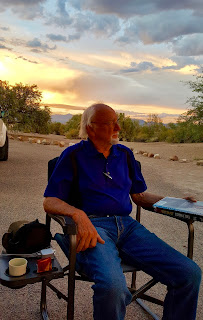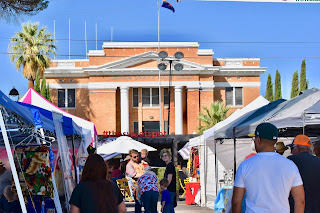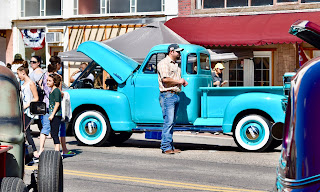"A salsa fest!", Mari said. "There is a salsa fest in Safford!"
Safford is just a couple of hundred miles east of Tucson. "Perfect," Mari said. "Just the kind of thing we had in mind, getting the Casita!"
 The fact is that just about everything is what we had in mind when we got the Casita. "Is it on a road?" Then it is what we had in mind.
The fact is that just about everything is what we had in mind when we got the Casita. "Is it on a road?" Then it is what we had in mind.We two--you may know that there are three of us now, but Michael offered at the last minute to take care of Cooper; our Min-Pin/Chihuahua, and he is no great fan of salsa, anyway--so the two of us drove to Safford.
 Maybe we should have brought Cooper. He'd have enjoyed the campground. We had scarcely arrived before our neighbors on the adjacent site took their three dogs for a walk of sorts. The Newfoundlander was no fan of warm-weather-walks, and Tank, the English bulldog, did not believe in walking, at all. He believed he would just stay wherever he was, however it was he got there. Their other dog, a King Charles Something or Other, whose name was Charlie, had carved out a niche as the only member of the family to flit about as if dogs naturally walked places.
Maybe we should have brought Cooper. He'd have enjoyed the campground. We had scarcely arrived before our neighbors on the adjacent site took their three dogs for a walk of sorts. The Newfoundlander was no fan of warm-weather-walks, and Tank, the English bulldog, did not believe in walking, at all. He believed he would just stay wherever he was, however it was he got there. Their other dog, a King Charles Something or Other, whose name was Charlie, had carved out a niche as the only member of the family to flit about as if dogs naturally walked places.Safford is not far away from Tucson, but once in Safford, it is evident that everything is quite a ways away from there. It is a County Seat town with incredibly wide streets and a population of ten thousand people, and they have a Salsa Fest. If you live in Graham County, you go to Safford for things, or you go a long ways.
 The Pinaleno Mountains protect Safford to the southwest, and Graham County protects the rest. Mt. Graham is up in the Pinalenos somewhere, and it is the site of--What else?--the Mt. Graham Observatory, operated by the University of Arizona.
The Pinaleno Mountains protect Safford to the southwest, and Graham County protects the rest. Mt. Graham is up in the Pinalenos somewhere, and it is the site of--What else?--the Mt. Graham Observatory, operated by the University of Arizona.  The largest binocular telescope in the world is being constructed up there and--I do not understand this--Mt. Graham is also home to the Vatican Advanced Technology Telescope, as well as the Heinrich Hertz Submillimeter Telescope. Things are looking up from the top of Mt. Graham.
The largest binocular telescope in the world is being constructed up there and--I do not understand this--Mt. Graham is also home to the Vatican Advanced Technology Telescope, as well as the Heinrich Hertz Submillimeter Telescope. Things are looking up from the top of Mt. Graham. In town, during the Salsa Fest, samples of everybody's famous salsa was being cooked under tents, being
tasted by heat-seeking tourists, and wolfed down by competitive masochists.
 The main drag through downtown had an honor guard of vintage and semi-vintage automobiles, and they had their own contest.
The main drag through downtown had an honor guard of vintage and semi-vintage automobiles, and they had their own contest.The Beer Garden was a Beer Tent on a Beer Lawn, but we remembered that we had an ice chest with us, at the campground, so we retreated under the watchful eye of the Vatican Advanced Technology Telescope to our home away from an adequate shower, hoping that Tank might stop by, but Tank remembered how far it was to the site next door, so we just toasted him.
A nomadic tribe of boy scouts, or future motor home owners, set up camp across the way, behaving much better than any of us can remember our own children having done. When I was a boy scout, the tents did not look like that: they looked like khaki-colored, armored canvas bunkers, and they weighed more than Tank. Not those tanks: Tank next door.
 The Pinalenos were still there, and the tail end of our Monsoon Season edged over just to make life pointless for the people at the observatory.
The Pinalenos were still there, and the tail end of our Monsoon Season edged over just to make life pointless for the people at the observatory. Sixty at night, and ninety during the day. The ice chest hovered just above 32 degrees. I read half a book by Jo Nesbø: Thirst, all the while satisfying mine.

Mari contemplated Roper Lake, created by the natural runoff from the Pinalenos. Water in the Sonora Desert, when there is some, is magical. On a point just across the near end of the lake, families picnicked and swam, grilled and paddled inflatable canoes, making family noises.
We have been in less pleasant places.
 On the way home, we stopped at one of Arizona's aspiring vineyards, proving to ourselves that just living next door to some other wine-growing State does not, of itself, make a great winery.
On the way home, we stopped at one of Arizona's aspiring vineyards, proving to ourselves that just living next door to some other wine-growing State does not, of itself, make a great winery. One the other hand, just selling Saguaro Jam, or leveling mountains for the copper and gold in them, does not make for greatness, either, so we bought a few bottles just in case we needed something to make us forget something. Or remember it.





Comments
Post a Comment